| (insert your NIE or newspaper logo here) |
Weekly Online LessonOnline Lesson ArchiveGrade Level: 4-6
|
O Canada
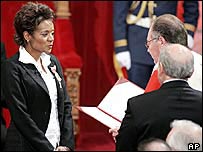 On
Tuesday, September 27, 2005, Haitian-born journalist Michaelle Jean
became Canada's 27th Governor General.
On
Tuesday, September 27, 2005, Haitian-born journalist Michaelle Jean
became Canada's 27th Governor General.
Unlike the United States, Canada keeps close ties to the British crown, so much so that Queen Elizabeth II is the nation's head of state.
But since the queen can't live in two places at once, it's the Governor General's job to represent Her Majesty in Canada on a daily basis.
Over the next five years, the Right Honorable Michaelle Jean's responsibilities will include overseeing Parliament, giving royal assent to bills passed by the House of Commons, meeting regularly with the prime minister and other senior government officials, welcoming world leaders, and acting as commander in chief of the Canadian Forces.
Jean grew up in the Canadian province of Québec. While most of Canada's provinces are dominated by British ties, Québec is strongly French, the home to a large number of descendants of settlers who came from France in the 16th and 17th centuries.
But as you'll discover during this week's lesson, Canada's population is not just composed of French and English descendents. Scottish, African, Chinese, and Aboriginal peoples have all had a hand in shaping modern Canada: its society, languages, government, and traditions.
Early Settlement
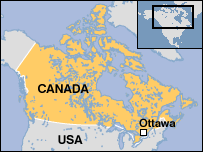 Start
your journey into the Great White North at the Canadian government's
Kids'
Site of Canadian Settlement.
Start
your journey into the Great White North at the Canadian government's
Kids'
Site of Canadian Settlement.
Roll your mouse over the name of each people, and you'll see on the map the primary locations where those people settled.
Why do you think some spots were most popular?
(If you'd like additional reference maps as you browse through the settlement site, visit The Atlas of Canada. For example, you can get maps for each Province and Territory.)
To find out more about where these different people came from and why they migrated to northern North America, explore each one by clicking on their name in the list. Start with The Acadians.
Read the Introduction, and then explore the History of these settlers to learn about the first settlement, Port-Royal, the Return to Acadia, the Coming of the Scots, the Acadians' Surrender to the British, their Expulsion, and what happened upon Returning Home.
How did the Acadians make a living before and after British control? What was the relationship like between the Acadians and the Mi'kmaq over the years? What kind of relationship did the Acadians have with the European-based French?
Next, get a taste of the Acadians' Daily Life.
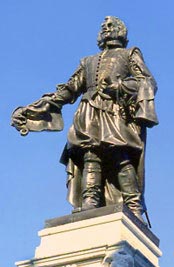 Who
was generally responsible for the different types of chores? What did
young women and men have to be able to do to prove they were ready for
marriage? What did they usually eat?
Who
was generally responsible for the different types of chores? What did
young women and men have to be able to do to prove they were ready for
marriage? What did they usually eat?
What else was their Culture based upon? What kind of Craft did they use?
Now, explore the lives of another migrant people: Africans.
How was their History of coming to and living in parts of North America different from that of the Acadians? Who were the first Africans in Port-Royal and New France, and how did they get there?
How did Africans fare during British Rule? Why did some Africans become Loyalists? What happened when they got Not Quite the Promised Land they expected?
Why did the End of Slavery in British North America finally come? What role did the Underground Railroad play in the Long Road to Freedom? How did Harriet Tubman help?
What was the Elgin Settlement, and why did so many Africans move west to British Columbia and to the Prairies? What other Challenges did Africans face?
What was their Daily Life like? What about their Culture and Craft?
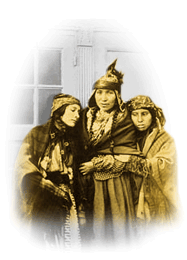 Similarly,
explore the other peoples and communities of early British North America,
including:
Similarly,
explore the other peoples and communities of early British North America,
including:
Where did the earliest settlers of each people arrive first? What brought them there? How did they live before and after British rule?
In what ways did these settlers interact with other cultures in the region? In what ways did the geography and ecology of different places in British North America influence settlements and daily life? How have the cultures of these people changed in modern times?
The Confederation
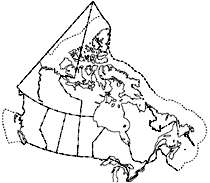 Now,
let's visit another website to discover how British North America became
the Confederation
of Canada we know today.
Now,
let's visit another website to discover how British North America became
the Confederation
of Canada we know today.
At this site, you can click on an underlined keyword for the definition.
Start with the Prelude as an overview, and then continue on to find out Why Confederation?, what happened On the Road to Confederation, and see which people were left in the Background.
What were the three main reasons for confederation? What had to happen politically for confederation to become reality? Why were some groups left out of the process?
Next, compare and contrast each of Canada's Provinces:
What types of natural resource or industries did each area primarily rely upon for economic stability and growth? What kinds of changes—economic, political, social, etc.—influenced each province's desire to become part of the confederation? Why did Nunavat become a province as recently as 1999?
Newspaper Activities
Browse issues of The Salt Lake Tribune to find any articles related to Canada. For example, look for stories about the economic, political, or social relationships between provinces, or between a province and the federal government, or between Canada and the United States. What factors are influencing the relationship the most? In what ways are different provinces responding to any new regulations or laws passed by the federal government? What kinds of details in information or photos do you notice that illustrate Canada's ties with the British crown? What aspects of Canadian society—overall or isolated to one province—are different from your own region's culture, economics, government, etc.?
© Copyright 2005
Learners Online, Inc.
